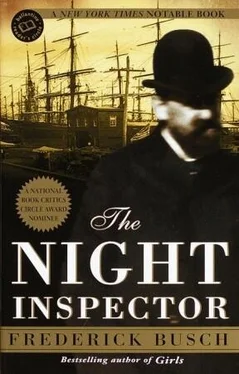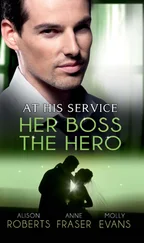I did not, however, see him making notes that day or in the camp that night. Sergeant Grafton insisted on disinfecting my neck with horse liniment; while Burton saw to the horses, the sergeant saw to me. And Sam, at his chores, did keep his eyes upon me, until I became nervy and snapped at him once when he asked a question about the charge of powder in the cartridges I employed.
“What difference can it make, Sam, for Christ’s sake?”
“In how they die and how you live, Mr. Bartholomew.”
“Well said,” the sergeant said from his blankets, where he lounged and smoked, his men having been seen to and Burton set upon patrolling the perimeter.
“Truly,” I relented. “I might be a little … eccentric tonight.”
“It was close this morning,” the sergeant said.
“Always, I suppose. But this morning, I felt as though, from the start, they had me.”
“And?”
“They weren’t that close,” I said.
“A half an inch away,” the sergeant said.
“How frightened were you?” Sam was young enough to ask it.
I was either veteran enough, or very young, and silence, in either case, would seem the only reply. I told him nothing.
Sam looked at me with his wide eyes, and I felt the pressure of his speculations. And I feel them now.
And here we poised, on the eve of the day of the eve. It was the middle of September, and hot in New York, but on the evening winds off the river there had come a hint of more than soiled water, and more than the dusty cliffs of New Jersey, and more than the smoke, dust, and corruption of the manufacturing process that was as dark upon the air as it was clamorous around our heads. It was a touch, barely a dilution in the general heat and stench and turmoil, of something cool, something like the seasons hinging toward fall. So we might change again, I thought.
I had been walking through the night. A vast hog had confronted me at St. John Street, once verging upon Africa, and we had stood there across from St. John’s Park, perhaps his bower and patrol, as if we were fighters in a duel, he sniffing my odor and backing up a pace, then coming forward a pace, as if he could not decide which part of me to snap and then suck down into his very large belly. His face seemed mild, almost comical, for he had a wound or growth near the bottom of his great lips on the rightmost side, and it made him look as if I struck him humorously.
“I will not be imprisoned on this street for you,” I told the hog. I had drawn my pistol, and I knew that I would fire.
Two women, quite pale and old and drawn inside the vast, dark skirts of their costumes, looking, really, like seamed, gray children in the clothing of adults, were about to pass me and cross toward the park when they saw what I stood before.
“Gretchen,” one of them said, “that man has a gun.”
“He has a wild pig, Eleanor.”
“Is he going to kill it?”
“Shall we ask him? Sir,” she called.
“Madam.” I turned to respond and, finally seeing me through their myopia, they each took several steps back.
“Gretchen, that man has a mask. Is he an outlaw?”
I wondered if it had been my grotesque appearance that gave the pig pause. “I advise that you effect a detour, ladies. Return, perhaps, to the corner of the street behind us and cross over there to the park.”
They fled me, and when I turned to the pig, he as well decided that I was a formidable presence and made his way along Canal. If he continued, I thought, he would arrive at the wharf of the Collins Liverpool Steamship line; embarking, he might become some of the famous Liverpool sausages.
I continued toward my home district, quite nearby to the east, and I was caught at the corner of Broadway and Leonard by a feeling I had known in the War. I wondered, in fact, if I roamed the city in an effort to capture these vagaries of mine; when I was unawares, and afoot, and adrift — for all my conspicuousness somehow still in hiding within the mask and the wound behind it — I walked into emotions that drifted upon the atmosphere of the streets as if they were smoke, or odors; in midstep, I was transported into a place I had been that was not New York and was not now. I thought, of a sudden, on the night before the day of our rescue of the Negro children, of a time when Sergeant Grafton found me outside our encampment in the week or thereabouts before they hunted me down.
“Mr. Bartholomew,” he said, coming up behind me and pausing. I had read the sounds of his approach and, from the size of the stride and sound of his breathing, I had known who approached.
“Sergeant,” I said.
“I have a sense that you are troubled,” he said, “and I wondered if I might be of some assistance.”
I turned to face him under a moonless sky and, in the darkness of those dense woods, I watched him swat at nighttime insects, a shape more than a particular man. “If you could see my face,” I said, “you would see me smile. I am grateful, but you cannot protect me from ghosts as if I were a child from whose dream I required rescuing. The ghosts, of course, are actual. Does that make any sense to you?”
“But you enjoy your work, Mr. Bartholomew. Or am I mistaken?”
“I cannot know what you mean by ‘enjoy,’ Sergeant. But I likewise cannot imagine that whatever pleasures a marksman might take in the execution of his duties have any effect upon the spirits of the dead.”
“You are haunted,” he said.
“Why are you not?”
“I do not kill them in that manner.”
“You believe,” I said, “that the manner of killing is a matter of any moment to the dead? Or, for that matter, to those who effect the death?”
“It is why there are rules.”
“There no longer are. Wars are fought between nations? Not the present one. Wars are a contest in the moral theater? Not this economic contest. Wars are for our right? Has Abe not abridged what once was promised by our Constitution? I do not know your rules, Sergeant. I am killing these people as best I can, and I am enduring the consequences. Cause and effect. If that is my lot, or being shot out of a tree by a Secessionist marksman intended to be my target, then cause will have been served by effect.”
I heard myself panting, and I required of my breathing that it grow quiet.
“You are attempting, then, to come to terms with your own conclusion,” Sergeant Grafton said. “You are an old man in some ways, are you not?”
“It is likely that I may not become one in the matter of years spent in breathing upon the earth. It’s therefore just as well that I age while I can, Sergeant.”
“Come in as soon as you can, then. Sam Mordecai is worried that you are unescorted in the forest.”
“Strange fellow,” I said. I ratcheted back the hammer of the Sharps. “I am never unarmed. You might tell him that.”
The sergeant paused, turned, then paused again and said, “When we have done with all this, when it is through, Mr. Bartholomew, and we are demobilized, as I pray will occur to you and me and our fellows back in the camp, I would like you to come as a guest to my home, my father’s home, in Saugerties. Do you know it?”
“On the Hudson,” I said, “far north of New York City. It is below where I live.”
“Which is?”
“Paynes Corners. A small settlement in the center of the state of New York. A hundred and more miles, I believe, north of you. Little is there, although the Payne after whom it is named is said to be a relative of the patriot who changed the spelling of his name because he was a loyalist during the War of Revolution. There weren’t rules in that one either, by the by. Which is how the Americans won.”
“You study war, then.”
“For the time being, Sergeant, war is what I am.”
Читать дальше












